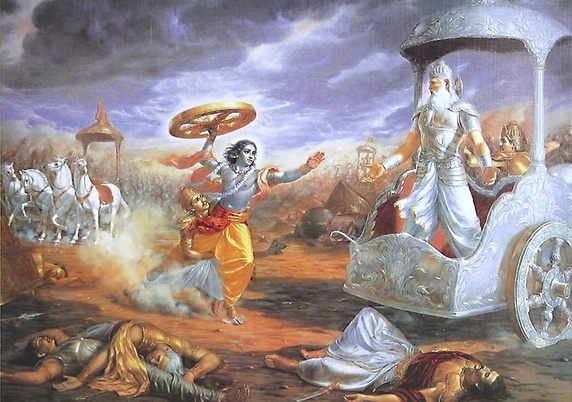श्रीभगवानुवाच |
कालोऽस्मि लोकक्षयकृत्प्रवृद्धो
लोकान्समाहर्तुमिह प्रवृत्त: |
ऋतेऽपि त्वां न भविष्यन्ति सर्वे
येऽवस्थिता: प्रत्यनीकेषु योधा: || 32||
The supreme lord said: Time I am, the great destroyer of the worlds, and have come here to destroy all people. With the exception of you [the pandavas] all the soldiers here on both sides will be slain.
During the battle of Mahabharata when Arjun asked lord Krsna who he was, in response to his question Shree Krishna reveals his nature as all powerful Time, the destroyer of universe. It is written in the Vedas that the supreme truth destroys everything, even the brahmanas. As stated in katha Upanishad (1.2.25)
Yasya brahma ca ksatram ca ubhe bhavate odanah
Mrtyur yasyopasecanam ka ittha veda yatra sah
If we ever wonder what time actually is and why did the supreme lord define it as a destroyer we might have to go through some historical records too. Time is profoundly a very brief topic. According to the Srimad Bhagavad Gita and others texts it is believed that the word kala, that is time, is derived from the word kalayati, which is synonymous to ganayati, meaning “to take count of”. If we look though it objectively, then time can be defined as the space between two events or two spots which is not same for all. For example if I wake up in the morning and grab a cup of tea. The period or the space between the two events is time. That space can be for 5 minutes or for you maybe for 10 minutes. Ultimately time is a subjective experience that proves that it is not equal for all even if time flows at the same constant speed all the time.
When we are in a state of flow or focus, objectively time may go on but our subjective experience is very limited. Atharva veda kand 19, suktha 53 says
का॒लो अश्वो॑ वहति स॒प्तर॑श्मिः सहस्रा॒क्षो अ॒जरो॒ भूरि॑रेताः। तमा रो॑हन्ति क॒वयो॑ विप॒श्चित॒स्तस्य॑ च॒क्रा भुव॑नानि॒ विश्वा॑ ॥1॥
“Kala or time is like a horse that carries seven rays, a thousand eyed, ageless entities brimming with abundant vigor. The wise continually seek to ascend it. Its wheels are the entire cosmos, containing all the worlds.”
This suktha starts with the nature of time linking it with the multiple universes. If we connect the sloka with the view of time we are able to imagine a ‘black horse with seven rays’ which signifies time and its unstoppable march. Its ‘seven rays’ represent diverse pathways into potential alternate realities. Time is described as a ‘thousand eyed’ and ‘ageless’ as it is an internal observer unbound by the strings of morality. His wheels all worlds behold ensure the notion that every rotation of time wheels births and countless universes.
Now coming back to what lord Krsna said about time and how did it become a destroyer for mankind. Time controls everything. With time everything breaks down. Everything ends one day. The moment you are currently living is the present, no one knows what might happen to you next. The following day can be your end and that is only controlled by time who is defined as the supreme lord. The force of time can destroy everything and it only acts in this material world. It does not exist at all in the spiritual nature. It is not on our control at all as it slips from our hands like sand which weaves a tapestry of our existence and shapes our lives. Even though the soul is immortal and never dies the cycle of life continues. Our acts in the present can only help us to live until we die. In contemplating time as a full pot, it is recognized as the eternal flow of creation and dissolution where every experience merge into the continuum of existence. It is a reminder from the supreme of being surrendered into the rhythm of time.
“time is the most valuable thing a man can spend”- Theophrastus


